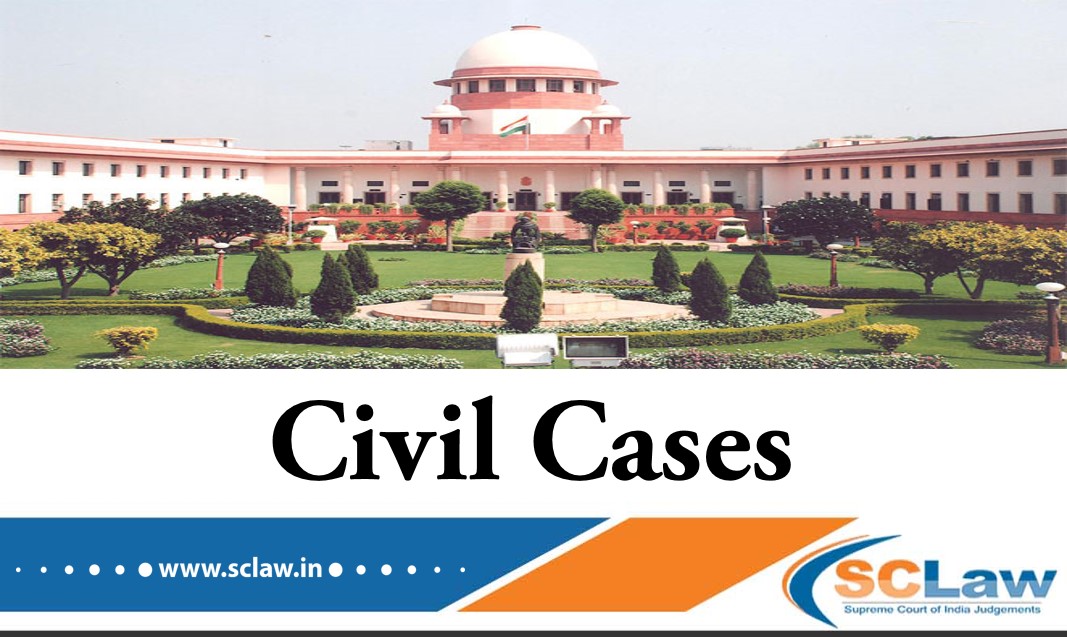Gift–Acceptance of– It is one thing to say that the execution of the deed is based on an aspiration or belief, but it is another thing to say that the same constituted an onerous gift. Gift–Acceptance of — Once a gift is complete, the same cannot be rescinded. For any reason whatsoever, the subsequent conduct of a donee cannot be a ground for rescission of a valid gift. Gift–Acceptance of–Whether an averment made in the deed of gift in regard to handing over of possession is sufficient proof of acceptance thereof by the donee? YES.
2008(1) Law Herald (SC) 87 IN THE SUPREME COURT OF INDIA Before The Hon’ble Mr. Justice S.B. Sinha The Hon’ble Mr. Justice Harjit Singh Bedi Civil Appeal No. 5942…
Accident–Compensation–Term ‘Income’–The amounts, which were required to be paid to the deceased by his employer by way of perks, should be included for computation of his monthly income as that would have been added to his monthly income by way of contribution to the family as contradistinguished to the ones which were for his benefit from the said amount of income, the statutory amount of tax payable thereupon must be deducted.
2008(1) Law Herald (SC) 80 IN THE SUPREME COURT OF INDIA Before The Hon’ble Mr. Justice S.B. Sinha The Hon’ble Mr. Justice Harjit Singh Bedi Civil Appeal No.…
Employment of women in any part of premises in which liquor or intoxicating drugs are consumed by the public–Justified.
2008(1) LAW HERALD (SC) 70 IN THE SUPREME COURT OF INDIA Before The Hon’ble Mr. Justice S.B. Sinha The Hon’ble Mr. Justice Harjit Singh Bedi Civil Appeal No. 5657…
Dishonour of Cheque—Offence by Company—If drawer of cheque (company) is not party, complaint qua accused is not maintainable merely because he was signatory of cheque. Dishonour of Cheque—Offence by Company—Complaint against director but company was not impleaded—Company cannot be allowed to be impleaded u/s 319 Cr.P. C—Complaint quashed.
2017(3) Law Herald (SC) 1794 : 2017 LawHerald.Org 1338 IN THE SUPREME COURT OF INDIA Before Hon’bie Mr. Justice J. Chelameswar Hon’ble Mr. Justices. Abdul Nazeer Criminal Appeal No. 1534…
Redemption of Mortgage—Mortgage by conditional sale—Determination of agreement—The significance of the words “repay”, “return” and “subject to this condition ” cannot be overlooked.
2017(3) Law Herald (SC) 1789 : 2017 LawHerald.Org 1239 IN THE SUPREME COURT OF INDIA Before Hon’ble Mr. Justice L. Nageswara Rao Hon’ble Mr. Justice Navin Sinha Civil Appeal Nos.…
Contempt —False Allegations on Registry of court—Amounts to contempt of court. Contempt—The contempt jurisdiction is not only to protect the reputation of the concerned Judge, but also to protect “the fair name of the judiciary”.
2017(3) Law Herald (SC) 1778 : 2017 LawHerald.Org 1270 IN THE SUPREME COURT OF INDIA Before Hon’bie Mr. Justice Jagdish Singh Khehar Hon’ble Mr. Justice Dr. D.Y. Chandrachud Hon’bie Mr.…
LANDMARK JUDGEMENT — Bail—Default Bail—If offence is punishable with imprisonment upto 10 years’ then accused in entitled for default bail after 60 days and where minimum sentence is 10 years or more then after 90 days.
2017(3) Law Herald (SC) 1745 : 2017 LawHerald.Org 1271 IN THE SUPREME COURT OF INDiA Before Hon’ble Mr. Justice Madan B. Lokur Hon’ble Mr. Justice Deepak Gupta Hon’ble Mr. Justice…
Accident–Compensation–Third party risk–Liability of Insurance Company–Non payment of premium–Cheque towards payment of premium of dishonoured–Insurance company not liable towards claim of owner but liability stands for third party, which is recoverable from owner of vehicle.
2008(1) Law Herald (SC) 64 IN THE SUPREME COURT OF INDIA Before The Hon’ble Mr. Justice S.B. Sinha The Hon’ble Mr. Justice Harjit Singh Bedi Civil Appeal No.…
Charge of unauthorized absence from duty on many occasions proved in enquiry–Order of termination from service passed–Termination from service under the circumstances justified.
2008(1) LAW HERALD (SC) 60 IN THE SUPREME COURT OF INDIA Before The Hon’ble Mr. Justice Dr. Arijit Pasayat The Hon’ble Mr. Justice P. Sathasivam Civil Appeal…
Court Fee—Suit not to be rejected on ground of non-payment of proper court fee.
2017(3) Law Herald (SC) 1736 : 2017 LawHerald.Org 1229 IN THE SUPREME COURT OF INDIA Before Hon’ble Mr. Justice Dipak Misra Hon’ble Mr. Justice A.M. Khanwilkar Hon’ble Mr. Justice Mohan…














